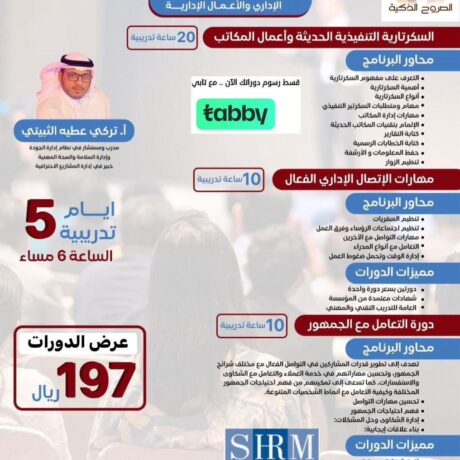وصف الدورة:
تهدف إلى توفير معرفة متعمقة حول كيفية مكافحة غسل الأموال والجرائم المالية، وتعريف المشاركين بأحدث الأساليب والتقنيات المستخدمة في هذا المجال. تهدف الدورة إلى تمكين المتدربين من فهم الآليات المعقدة التي يقوم عليها غسل الأموال، بالإضافة إلى تعزيز مهاراتهم في تطبيق استراتيجيات الامتثال والالتزام بممارسات وقوانين مكافحة غسل الأموال على مستوى المؤسسات المالية والقطاع الخاص.
أهداف الدورة:
1) فهم مفهوم غسل الأموال: تعريف المشاركين بمفهوم غسل الأموال وأبعاده القانونية والمالية.
2) تحديد أساليب وتقنيات غسل الأموال: دراسة الأساليب الحديثة التي يستخدمها المجرمون لتحويل الأموال غير المشروعة.
3) تدريس استراتيجيات مكافحة غسل الأموال: تعلم الأدوات والآليات التي يمكن استخدامها للكشف عن عمليات غسل الأموال ووقفها.
4) تعريف مبادئ الامتثال والقوانين المحلية والدولية: فهم دور الامتثال للقوانين الوطنية والدولية في مكافحة غسل الأموال.
5) تطبيق استراتيجيات الامتثال المؤسسي: تدريب المشاركين على كيفية تطبيق سياسات مكافحة غسل الأموال داخل المؤسسات المالية.
6) تحليل وتقييم المخاطر: تدريب المتدربين على كيفية تحديد المخاطر المحتملة المرتبطة بغسل الأموال وتقديم حلول للحد منها.
7) التفاعل مع تقارير الأنشطة المشبوهة: فهم كيفية التعرف على الأنشطة المشبوهة وتقديم التقارير المناسبة إلى الجهات المختصة.
8) تعزيز الوعي المؤسسي: توعية الموظفين بأهمية مكافحة غسل الأموال وأثره على المؤسسات والمجتمع.
⏱️ Duration: 3 days – 18 intensive training hours
What you will learn?
- By studying the course "Modern Anti-Money Laundering Methods and Compliance Principles", the trainee will acquire the skills and knowledge necessary to become an expert in combating money laundering and implementing effective compliance policies. The most important of these skills are:
- 1) Understanding money laundering patterns: Learning how to recognize the various methods of money laundering operations and how to track them.
- 2) Money laundering detection methods: Learning how to use modern tools to monitor and detect suspicious financial activities and detect money laundering attempts early.
- 3) Compliance with local and international laws: How to comply with anti-money laundering requirements according to local and international laws and their application in financial institutions.
- 4) Managing risks associated with money laundering: Learn how to assess potential risks and deal with them efficiently to improve institutional performance and reduce illegal practices.
- 5) Adhering to international standards: Learn about international standards such as FATF (Financial Action Task Force) that define the basic steps in combating money laundering.
- 6) Reporting and interacting with regulatory bodies: Learn how to prepare suspicious activity reports and submit them to the relevant authorities accurately and in a timely manner.
- 7) Improving institutional compliance practices: Applying best practices in combating money laundering by creating an integrated legal compliance environment within the organization.
- 8) Raising awareness and continuous training: Raising awareness among employees in financial institutions about modern methods of combating money laundering and providing continuous training programs.



